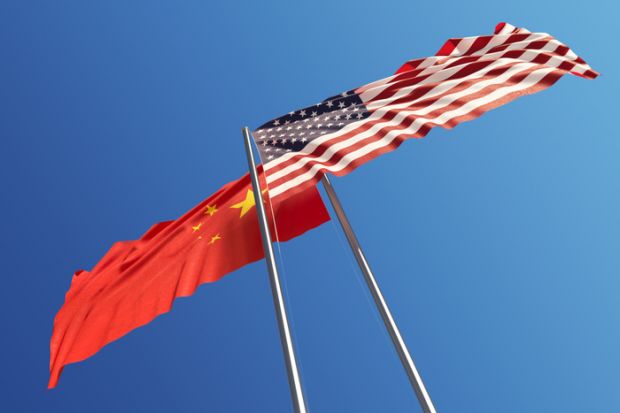US university leaders are increasingly shying away from collaborations with China for fear of getting blacklisted by national research funders, academics have warned.
As tensions rise between the US and China, top administrators were opting to discourage research partnerships rather than make a misstep that could result in the loss of millions of dollars in institutional funding, explained two scholars with decades of experience in brokering Sino-US research.
“I have no doubt whatsoever that many, but not all, risk-averse administrators are doing so. After all, why risk it?” said Da Hsuan Feng, honorary dean of Hainan University Belt and Road Research Institute and formerly vice-president for research at the University of Texas at Dallas.
Investigations into academic espionage and confusing and uncoordinated regulations by different government funders had left universities to fend for themselves in creating a paper trail of their research activities, he said.
“There’s no standard – the bottom line is, universities have been under tremendous pressure from funding agencies.”
University presidents, especially, would be wary of collaborations with China because their performance is tied to whether research funding increases during the tenure of their presidency, he said.
The situation has undergone a sea change in recent decades. Back in the early to mid-1980s, when Professor Feng was programme director for theoretical physics at the National Science Foundation, national security was not even “part of the directives” to the funder, he said.
Today, however, both universities and funders are putting security concerns at the top of their agenda, agreed Shin-Shem Steven Pei, professor of physics and electrical engineering at the University of Houston.
“Until fairly recently, the ‘national security’ narrative was never explicitly part of the non-classified research and research collaboration national or international landscape,” he said.
For “sensitive” areas, funding agents had a “well-defined review and release process for researchers to follow”, he noted.
“When a university like Johns Hopkins University…explicitly [wants] to carry out defence-related research, it does so by setting a separate campus such as the Applied Physics Laboratory away from the campus. Within the university structure, there is explicitly a vice-president for research whose portfolio is simply to deal with the APL.”
But “non-sensitive” research is less clearly defined and there is no bulletproof defence if a university is investigated by the government for research ties that breach national security, said Professor Feng.
“The problem is, ‘national security’ is very difficult to define,” he said. “Once it comes into play, essentially there’s almost no argument against it.”
Register to continue
Why register?
- Registration is free and only takes a moment
- Once registered, you can read 3 articles a month
- Sign up for our newsletter
Subscribe
Or subscribe for unlimited access to:
- Unlimited access to news, views, insights & reviews
- Digital editions
- Digital access to THE’s university and college rankings analysis
Already registered or a current subscriber? Login







